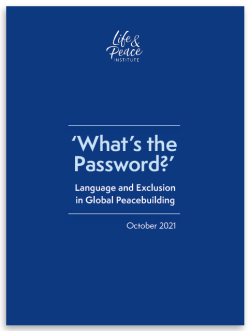Publications & reports
What’s the Password: Language and Exclusion in Global Peacebuilding
This report explores the ways in which language affects inclusive decision-making on peacebuilding, reducing opportunities for meaningful engagement between global decision makers on peace and conflict and local peace actors that lead the practice of peacebuilding in their own environments.

- Date
- Type
- Report
Summary
Through analysis of the 2019 High-Level Political Forum (HLPF) on Sustainable Development in New York at the United Nations (UN)headquarters, this report explores the ways in which language affects inclusive decision-making on peacebuilding, reducing opportunities for meaningful engagement between global decision makers on peace and conflict and local peace actors that lead the practice of peacebuilding in their own environments. It assesses the relationship between language, power, and agency in the peacebuilding sector: Who is using the language, with what aims, in which places, and in communication with which actors?
In addition, this analysis highlights the ways in which global peacebuilding discourse might be changing, and the actors that are catalysing this change: Who is breaking with linguistic expectations and rules, and what does this mean for the relationships between global and local stakeholders on peace and conflict? Instead of presenting a series of recommendations, this analysis raises further questions about how to advance global peacebuilding discourses that are more inclusive (or at least less exclusive). These questions call for greater collective thinking on the effects that language has on the practice of (local) peacebuilding and the functioning of the global peacebuilding sector.